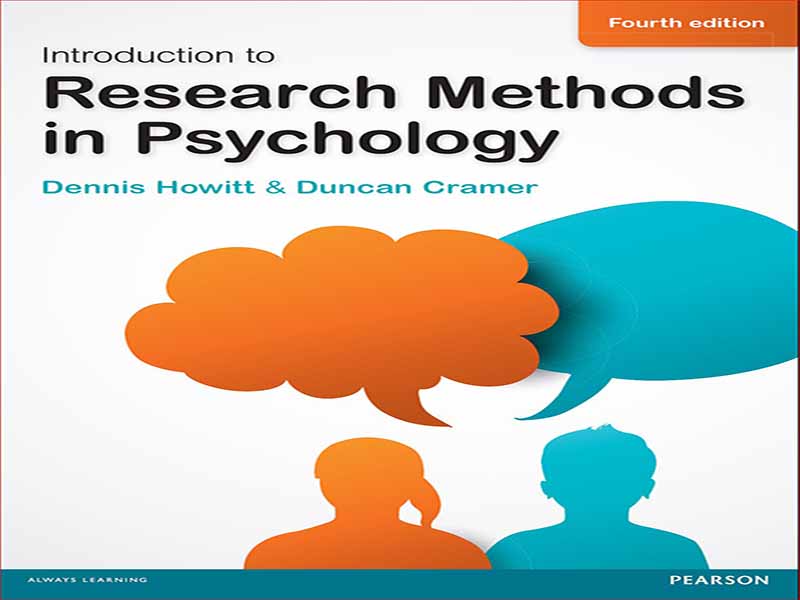- عنوان کتاب: Introduction to Research Methods in Psychology
- نویسنده/انتشارات: Dennis Howitt & Duncan Cramer
- سال انتشار: 2014
- حوزه: روش تحقیق
- تعداد صفحه: 531
- زبان اصلی: انگلیسی
- نوع فایل: pdf
- حجم فایل: 8.91 مگابایت
تحقیقات روانشناسی مدرن یک فعالیت پیچیده است. ویرایش چهارم کتاب مقدمهای بر روشهای تحقیق در روانشناسی یکی از مجموعهای از سه کتاب است که رویکردهای اصلی تحقیق و تحلیل روانشناختی را که در حال حاضر انجام میشود، پوشش میدهد. با توجه به گستره روانشناسی مدرن، یک جلد واحد ترکیبی از آمار و روش های تحقیق برای رفع نیازهای دانشجویان و محققان غیرعملی است. امروزه این رشته از نظر سبک های تحقیقاتی که به کار می گیرد بسیار متنوع است و پیچیدگی روش شناختی و آماری که در حال حاضر از آن برخوردار است، حتی چند سال پیش هم در رویا نبوده است. تحقیق خوب نیاز به فکر، درک و تجربه دارد – این یک تمرین ساده برای پیروی از قوانین نیست و تظاهر به اینکه چنین است به دانش آموزان آسیب می رساند. از نظر ما، پیشرفت باورنکردنی روانشناسی مدرن به این معنی است که منابع آموزشی باید برای به روز نگه داشتن و کنار آمدن با انواع تجربیات آموزشی مختلف ارائه شده توسط دانشگاه های مختلف تلاش کنند. در قلب، هر جلد در سه گانه ما به صورت مدولار ساخته شده است. یعنی ما انتظار نداریم که تمام مطالب آنها توسط مدرسان و سایر مدرسان پوشش داده شود. در عوض، منویی از فصلهای عمدتاً مستقل وجود دارد که میتوان از آنها انتخابهای مناسبی انجام داد. این با پوشش مقدمه ای بر روش های تحقیق در روانشناسی نشان داده شده است. این غیرعادی است زیرا هم تحقیقات کمی و هم کیفی به طور عمیق پوشش داده شده است. اینها معمولاً اما به نظر ما به اشتباه به عنوان رویکردهای جایگزین و ناسازگار برای تحقیقات روانشناختی تلقی می شوند. برای برخی از محققان، ممکن است یک ناسازگاری فکری بین این دو وجود داشته باشد. از منظر ما، بسیار مهم است که دانشآموزان ریشههای فکری این دو سنت، چگونگی تحقیق در این سنتها و اینکه هر سنت قادر به دستیابی به آن است را درک کنند. ما بر این باوریم که دانشآموزی که اینقدر آگاه است، در موقعیت بهتری برای انتخاب هوشمندانه و مناسب در مورد سبک تحقیق مناسب برای سؤالات تحقیقی که میخواهد به آنها بپردازد، خواهد بود. به خودی خود، مطالب کیفی در این ویرایش چهارم به طور مؤثری از بسیاری از تحقیقات کیفی که احتمالاً امروز انجام می شود پشتیبانی می کند. به همان اندازه توصیه ها و نظریه های عملی مفصلی وجود دارد که در اکثر کتاب های روش تحقیق کیفی موجود است. (اگر بیشتر نیاز باشد، کتاب دنیس هویت (2013)، مقدمه ای بر روش های کیفی در روانشناسی، هارلو: آموزش پیرسون احتمالاً نیازهای شما را برآورده می کند.) اما این علاوه بر پوشش کمی است که به راحتی از هر رقیبی پیشی می گیرد. از تنوع، عمق و اقتدار. ما سعی کردهایم منابعی را برای دانشآموزان فراهم کنیم تا به روشهایی که بیشتر متون دیگر آن را نادیده میگیرند، به آنها کمک کنیم. به عنوان مثال، فصل جستجوی ادبیات بسیار جامع و کاربردی است. به همین ترتیب، فصل اخلاق با جدیدترین استانداردها مطابقت دارد و به طور عمیق به آنها می پردازد. فصل نوشتن گزارش های پژوهشی، نوشتن گزارش را در مرکز فرآیند تحقیق قرار می دهد تا به عنوان یک افزودنی در پایان. ما استدلال می کنیم که یک دانش آموز به درک ماهیت تحقیق در روانشناسی نیاز دارد تا بتواند یک گزارش تحقیق رضایت بخش بنویسد. با این حال، ما فصلی را گنجاندهایم که بسیاری از مشکلاتی را که در گزارشهای تحقیقاتی در پاسخ به درخواستهای چنین مطالبی یافت میشوند، نشان میدهد. همچنین در این کتاب برخی از بحث های آماری را خواهید دید. در بیشتر موارد، این زمانی است که به موضوعاتی می پردازیم که در کتاب های آماری محبوب مبتنی بر SPSS وجود ندارند، صرفاً به این دلیل که SPSS همه موارد مفید در تحقیقات روانشناسی را پوشش نمی دهد. تا جایی که ممکن است سعی شده است تا مهارت های عملی و همچنین مرور مفهومی لازم از روش های تحقیق در روانشناسی نوین را در اختیار دانشجویان قرار دهیم. با این وجود، محدودیتی برای این وجود دارد. نکته پایانی این است که هر کسی که مایل به درک تحقیق است، باید تحقیق را بخواند، نه صرفاً برنامه ریزی، اجرا، تجزیه و تحلیل و نوشتن تحقیق. از این رو، تقریباً از همان ابتدا تأکید می کنیم که خواندن صرفاً اجتناب ناپذیر نیست، بلکه بسیار مهم است. بدون چنین مطالعه اضافی، نکته این کتاب مغفول مانده است. این به عنوان مجموعه ای از مسائل فنی بیش از حد خسته کننده نیست که بخشی از هر ماژول دیگری به جز یکی از روش های تحقیق باشد. مطالب موجود در این کتاب به منظور گسترش درک دانشجویان از روانشناسی با توضیح چگونگی ایجاد روانشناسی توسط محققان است. گاهی اوقات این می تواند بسیار هیجان انگیز و همچنین خسته کننده و خواستار باشد. این پنجمین کتابی است که نویسندگان با هم نوشته اند.
Modern psychological research is a complex activity. The fourth edition of Introduction to Research Methods in Psychology is one of a set of three books covering the major approaches to psychological research and analysis as currently practised. A single volume combining statistics and research methods to meet the needs of students and researchers is impractical, given the scope of modern psychology. Nowadays the discipline is extremely varied in the styles of research it employs, and the methodological and statistical sophistication that it currently enjoys would have been undreamt of even just a few years ago. Good research requires thought, understanding and experience – it is not a simple rule-following exercise and to pretend that it is does students a disservice. To our minds, the incredible progress of modern psychology means that teaching resources must struggle to keep up-to-date and to cope with the variety of different educational experiences provided by different universities. At heart, each volume in our trilogy is modularly constructed. That is, we do not expect that all their contents will be covered by lecturers and other instructors. Instead, there is a menu of largely self-contained chapters from which appropriate selections can be made. This is illustrated by the coverage of Introduction to Research Methods in Psychology. This is unusual in that both quantitative and qualitative research are covered in depth. These are commonly but, in our opinion, wrongly seen as alternative and incompatible approaches to psychological research. For some researchers, there may be an intellectual incompatibility between the two. From our perspective, it is vitally important that students understand the intellectual roots of the two traditions, how research is carried out in these traditions, and what each tradition is capable of achieving. We believe that the student who is so informed will be better placed to make intelligent and appropriate choices about the style of research appropriate for the research questions they wish to address. On its own, the qualitative material in this fourth edition effectively supports much of the qualitative research likely to be carried out today. There is as much detailed practical advice and theory as is available in most books on qualitative research methods. (If more is required, the book by Dennis Howitt (2013), Introduction to Qualitative Methods in Psychology, Harlow: Pearson Education will probably meet your requirements.) But this is in addition to the quantitative coverage, which easily outstrips any competition in terms of variety, depth and authority. We have tried to provide students with resources to help them in ways largely ignored by most other texts. For example, the chapter on literature searches is extremely comprehensive and practical. Similarly, the chapter on ethics meets the most recent standards and deals with them in depth. The chapter on writing research reports places report writing at the centre of the research process rather than as an add-on at the end. We would argue that a student requires an understanding of the nature of research in psychology to be able to write a satisfactory research report. However, we have included a chapter which illustrates many of the problems that are found in research reports in response to requests for such material. You will also find some discussion of statistics in this book. For the most part, this is when dealing with topics which are missing from the popular SPSS-based statistics textbooks, simply because SPSS does not cover everything useful in psychological research. As far as is possible, we have tried to provide students with practical skills as well as the necessary conceptual overview of research methods in modern psychology. Nevertheless, there is a limit to this. The bottom line is that anyone wishing to understand research needs to read research, not merely plan, execute, analyse and write-up research. Hence, almost from the start we emphasise that reading is not merely unavoidable but crucial. Without such additional reading, the point of this book is missed. It is not intended as a jumble of technical stuff too boring to be part of any module other than one on research methods. The material in the book is intended to expand students’ understanding of psychology by explaining just how researchers go about creating psychology. At times this can be quite exciting as well as frustrating and demanding. This is the fifth book the authors have written together.
این کتاب را میتوانید از لینک زیر بصورت رایگان دانلود کنید:
































نظرات کاربران